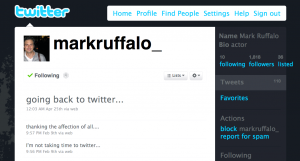It’s a new day for public relations and crisis communication strategy as social channels pave the way for a more consensual, grassroots decision-making model. Newspaper press releases once meant a lot in the court of public opinion—PR pros used them to get out in front of the message and influence perception. There was a sense of control. But who controls the message now?
When actor Mark Ruffalo received lukewarm reviews for his directorial film debut at Sundance, Sympathy for Delicious, he could have given up— it’s Sundance, after all, they must know what they’re talking about. Instead, he turned to another sounding board, Twitter, and used the court of public opinion to turn things around and let another message run its course.
“The one thing I sensed in these reviews is there was a meanness in them that didn’t smack of honesty,” says Ruffalo, who believed he was being attacked for being audacious enough to direct. “With Twitter it’s possible to control your message—I just faced it head on, and all of the sudden this counter-movement started in response to the bad reviews and people were taking up the cause of the movie,” says Ruffalo.
Who Controls The Message Now?
The Blind Side didn’t suit the tastes of Hollywood, but the film’s promoters took a different communication and marketing strategy—up the middle, directly to the people to help shape public opinion. The principle is the same: They could have given up when Hollywood said they didn’t like it. Instead, Grace Hill took the unusual step of offering online sermon outlines based on The Blind Side, with clips that could be used in churches equipped with video screens. According to best estimates, about 23,000 churches downloaded the sermons, and this built an exceptionally strong base for the film (sports fans, families, churchgoers, and do-gooders). The best picture nomination by the Academy of Motion Picture Arts & Sciences speaks for itself.
 This puts communicators on a different side of the table. Digital press releases still have their place and can markedly boost traffic to our sites. But instead of trotting out the same familiar message, we need to think of ways to facilitate conversations that solve problems, tapping the collective wisdom of our community, workplace, or business associations.
This puts communicators on a different side of the table. Digital press releases still have their place and can markedly boost traffic to our sites. But instead of trotting out the same familiar message, we need to think of ways to facilitate conversations that solve problems, tapping the collective wisdom of our community, workplace, or business associations.
We have new channels open to us as communicators and must align our messages accordingly. Our plan can be flexible, iterative and responsive: We can weave conversation from social channels into our communication planning and let this feedback inform our strategy. In giving up control of the message we commit to finding creative solutions we may have never considered.
So roll with it. Be an artist, working effectively to listen and learn from the channels that are available. Would Shakespeare blog if he were alive today, someone asks? Not sure. I know he didn’t invent plays, but he used the medium effectively to express his art.
What about you? Fear of losing control is a great reason to avoid social media channels, but not a valid one.
As always, I’d love to hear your perspective.
(Photo credit: Unsplash. Updated, Aug. 8, 2016)





Whoa Dom:
Excellent points. I think its also important for communicators to feel (or be) empowered to take the lead in these types of situtations. It certainly puts you on the road to senior advisor status when you step up to the challenge.
Great post.
– Shara
Thanks a bunch, Shara. Yes, it takes guts to move from a content-creator to “conversation-enabler.” It’s still new; we’re feeling our way as we go, and the path to informing our communication plans with robust feedback can be a bumpier ride. You’re right, this is a differentiator of senior-level communication advisement. It takes patience and courage to give up control of the message, and maybe a little faith in the wisdom of our communities. But two-way (and all-way) communication is here to stay and I think it brings a new freshness to our task as communicators.
For us it’s not so much a fear of losing control, it’s a resource issue. Having people dedicated to social media is expensive and time-consuming. Also, if your company is more focused on b2b than b2c it’s also harder to justify. Plenty of social media experts will tell you that b2b businesses should be using social media just as much as b2c businesses, and these are often the same consultants who want to sell you their social media services or expertise.
Hello, thanks for taking the time to weigh in. In thinking this through from a b2b perspective it might make sense to consider the value of social media in terms of reputation management. Not sure — I don’t know anything about your firm or its size — but you may find that having a voice in the conversation may be useful in the future if someone were to try to paint your firm into a corner and say something damaging or untrue. There are tools available to monitor these conversations about your firm– and if they’re happening, you may want your perspective to be included. So again, in terms of scarce resources, it may make sense to understand the opportunity cost of not properly managing your firm’s reputation. Hope this helps– just wanted to try to provide another way of looking at it.